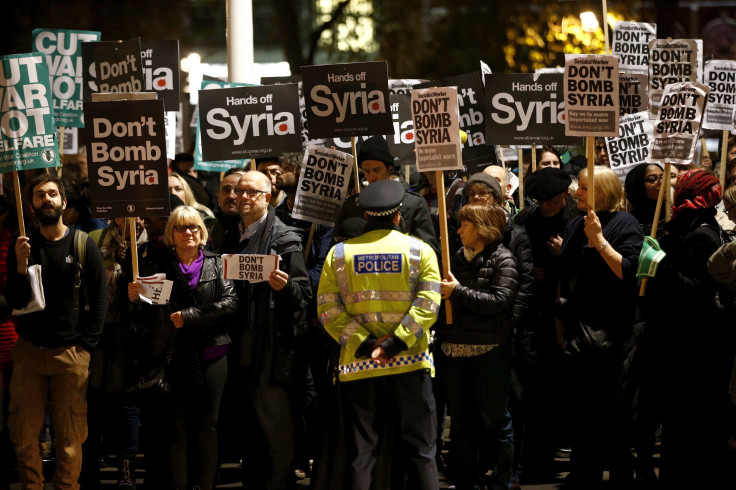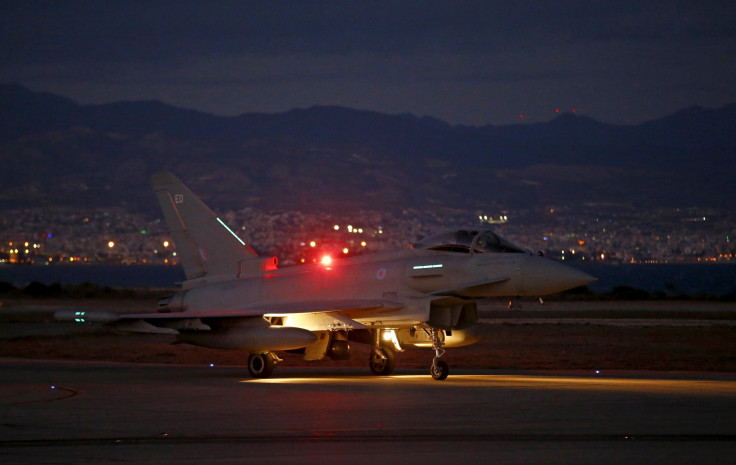Chaos In Syria: Why UK Joining Airstrikes Campaign Could Be Bad News For Global Security, Syrians

Only hours after Britain’s Parliament voted to begin airstrikes in Syria, war planes dropped bombs Thursday at the Omar oil field in eastern Syria, targeting the infrastructure that funds the Islamic State group. With France, Russia and the U.K. all beginning airstrikes in Syria, the U.K. chose a target with a low chance of collateral damage that had previously been hit by U.S.-led coalition forces.
With over 3,000 airstrikes already launched in Syria over the past year and more to come, the possibility of collateral damage and other complications on the ground remains high as the U.K. said it expects to fight ISIS for years -- not months. As more countries join long-term efforts to combat the militant group following the Nov. 13 terror attacks in Paris, experts warn that the risk of a collision or an air incident, especially with noncoalition member Russia, presents a big challenge in Syria. Just last week, Turkey shot down a Russian warplane, saying the aircraft had violated its sovereign airspace.
“When you increase the number of aircraft in combat operations, and you increase the number of nationalities of forces fighting, by its very nature there is risk of some kind of incident,” said Robert Ford, former U.S. ambassador to Syria from 2011-2014 and senior fellow at the Middle East Institute in Washington, D.C.
With multiple countries operating in the airspace above northern Syria -- sometimes only miles apart -- experts argue cooperation is needed more than ever to ensure another incident doesn't take place, but U.S.-backed coalition forces have maintained a strong line against the Kremlin. Russia began airstrikes in Syria in late September, and U.S. and other Western officials say Russian airstrikes are meant to prop up long-time ally Syrian President Bashar Assad instead of taking out ISIS.
“We do not coordinate operations with the Russian Federation,” said Elizabeth Trudeau, director of the press office at the U.S. State Department. “There is no provision in the memorandum of understanding to share that information.”
But with another country added to the mix this week and so many airstrikes taking place in close proximity, coordination between Russia and U.S.-backed coalitions will be key moving forward, experts said.
“Quite a bit of work has been done with Russia and U.S. to [de-escalate conflict]," said Malcolm Chalmers, deputy director general at the Royal United Services Institute in London, where he focuses on U.K. security policy. "But the more the areas where Russia and NATO overlap, the greater the risk.”
The growing tension between Turkey and Russia, once strong trade allies, underscores the potential for conflict with so many war planes in one space. Since Turkey brought down the Russian aircraft, Moscow has applied sanctions against Turkey and Russian President Vladimir Putin said in his state of the nation address Thursday that Turkey would “regret” shooting down the Russian Su-24 aircraft.
“The Russians need to smarten up on the border and stay away from the border [with Turkey],” said Thomas M. Sanderson, director and senior fellow at transnational threats project at Washington, D.C.-based think tank Center for Strategic and International Studies. “There are plenty of other targets they can hit in the country that don’t require them flying along the border.”

Other countries could soon join the war against ISIS, further complicating the fight in Syria, experts said. The German Parliament is likely to approve Friday sending six reconnaissance planes, refueling aircraft, 1,200 military personnel and a ship to protect a French aircraft carrier. Berlin has stopped short of conducting airstrikes in Syria, describing the situation in the Middle Eastern state as an “abyss.”
Gulf states -- including Saudi Arabia, Jordan, the United Arab Emirates, Bahrain and Qatar -- have supported some airstrikes; however, the United Arab Emirates stopped its airstrikes after a Jordanian pilot whose plane went down over Syria was captured and killed.
The potential for new airstrikes has also raised concerns about the threat of excess collateral damage on the ground. The U.S., along with several other countries, have warned that Russian airstrikes not targeting ISIS would “fuel more extremism and radicalization.” More than 220,000 have died in the civil war in Syria, and civilians living in ISIS-controlled territory could lose sources of income as strikes target key economic infrastructure including oil facilities.
“Radicalism will increase,” said Sanderson. “More people will join up, and that’s not a good thing because that creates a cycle. But what are the options? There are no good plans in this war.”
© Copyright IBTimes 2024. All rights reserved.






















